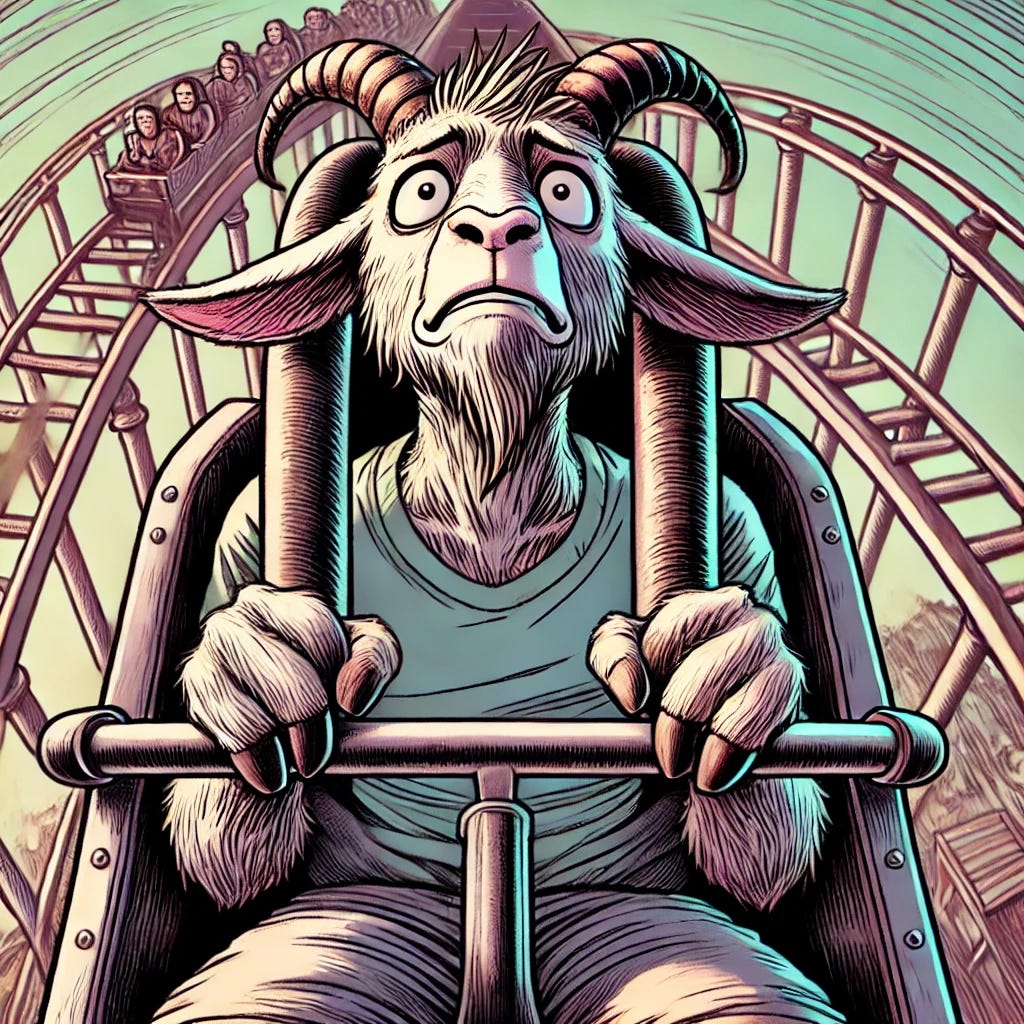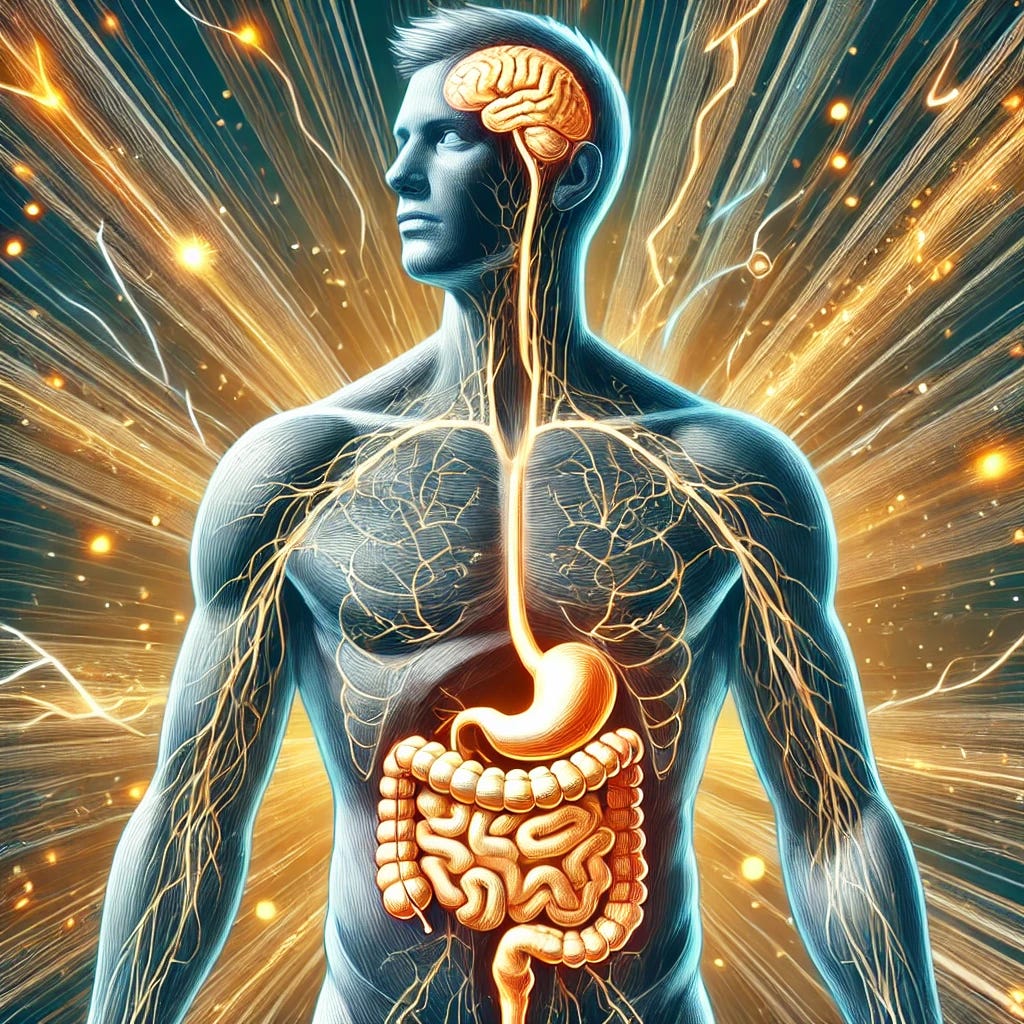Nausea and Euphoria
I remember riding a roller coaster with really steep drops. Maybe I was about 10 or 11 years old, around that peak where you want to prove to yourself that you can overcome your own internal challenges.
Showing my friends that I wasn’t afraid to fall from heights that would leave me splattered on the pavement below seemed like a good idea at the time.
Nausea—or some kind of similar queasy feeling—was starting to become a regular guest in my daily routine. This was due to anxiety caused by the rapid changes in my body, no doubt easily explained by the onset of puberty.
This anxiety wasn’t all that different from the feeling when your roller coaster car goes into freefall. Your stomach experiences both in a similar way.
One person’s idea of torture is another person’s idea of a good time, but the heady rush you might feel from a roller coaster originates from the same place as the feeling of terror your friend feels on that same roller coaster. It has a similar origin to your performance anxiety, too.
Both nausea and euphoria are triggered by the autonomic nervous system. This same system controls your heart rate, breathing, and other involuntary but automatic processes your body knows how to do.
If your body is falling through space, your fight-or-flight response gets triggered by this same system. This is because you need the rapid-fire decision making ability of the autonomic nervous system to decide an action for you by making you feel a certain way.
Now, you might think of nausea and euphoria as polar opposites. After all, if you get on that roller coaster, you’re either going to feel really bad or really good. The feeling from dropping is usually one or the other, and it’s normally very stark.
Or is it? In fact, both feelings have a lot in common. For one thing, they both indicate a heightened sense of awareness or alertness. Your body is letting you know that something important is happening, so you should pay attention.
This is what adrenaline does. You kind of get hyped up, not necessarily in a positive or negative way—just very hyped. There’s a heightened sense of anticipation, and you’re paying attention to every little detail now, so you’re taking in a lot more sensory input.
Meanwhile, your body diverts blood away from where food is digested (your gut) and into your muscles, where you might need them to fight off a tiger or deliver a speech. Your body really isn’t sure which it will be, so it gives you the same kind of feeling either way.
Your heart rate increases for the same reasons, and so does your breathing (although not always). Then, you either feel good… or bad.
Dopamine is your body’s party-starter. It’s the way your body lets you know you’ve done something it very much appreciates, and you can even release dopamine when you’re just anticipating an experience. If you’ve ever felt just as good anticipating an upcoming game release as when you got the game, this is why.
On the flip side, endorphins can elevate your mood after a period of stress has passed. If you feel a rush after a punk show, these guys are to thank. Endorphins can also reduce pain, so you might need them after a stressful experience.
Then, there’s cortisol. This is called the stress hormone for good reasons, and while it might seem totally negative, cortisol can wake you up and get you ready for a fight in short order. If an experience (like our roller coaster) feels particularly intense, it’s probably due to cortisol.
You can probably see that this swirl of emotions and feelings and chemicals all contributes to a wide range of experiences. So far, I’ve only talked about the gut, though. There’s an important connection between the gut and brain we should probably touch on next.
This highway is called the vagus nerve. Here, signals can travel back and forth between your gut and brain, where the amygdala decides how the signal should be interpreted in that particular instant.
This is what you feel when your gut drops out from underneath you, but it’s also possible for your prefrontal cortex to reframe this signal. This is why you can sometimes overcome a fear and come to enjoy whatever it was that you were afraid of, as with my early obsession with horror movies or punk rock shows. Instead of a spike in cortisol upsetting you, your brain can tell you this is fine. Er, fun.
Do you find yourself enjoying roller coasters or live performances? Are there other areas where your cortisol spikes and you find yourself actually enjoying something that used to induce nausea?






Our Physiology always amazes me. A fun one for you to look at is the Mamalian dive reflect. If you ever want some fun freediving videos to augement, just let me know.
My first thought related to this was to Jean-Paul Sartre, who wrote a book called "Nausea". But, given his pessimistic personality, he would have been unlikely to have written one about euphoria.